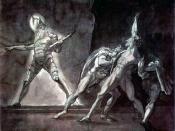"Hamlet", one of William Shakespeare's earliest tragedies, is often thought of as his most personal playwright. It is a tale of murder, revenge, deceit, and spying all stemming from the murder of the king of Denmark, King Hamlet. As Michael Neil summarizes, it is a narrative of "a king killed by his brother, who then marries the dead kings widow, of the young price who must pretend to be mad in order to save his own life, who eludes a series of traps laid for him by his wicked uncle, and who finally revenges his fathers death by killing the uncle" (Neill, 310). Numerous themes and ideas can be recognized throughout the entire body of the play such as revenge, appearance versus reality, and madness. Although there are many contrasting themes that are touched upon throughout the course of the play, each is connected to unifying themes and images of poison, disease and decay in each of the characters, and in Denmark as a whole.
Before the play even begins Claudius, the late King Hamlet's brother and his murderer, has already corrupted and poisoned the entire state of Denmark. Claudius does this by usurping his brother's authority out of jealousy and his own desire to gain power. Like a number of other instances during the play, Claudius literally uses poison to defeat his enemy. When King Hamlet is sleeping in the garden at the castle of Elsinore, Claudius comes up and pours a deadly poison into his brother's ear. The poisoning of King Hamlet's body directly leads to and results in the poisoning of the actual kingdom of Denmark. Not only has Claudius succeeded in poisoning the ear of the king, he has poisoned "the whole ear of Denmark" (I, 5: 43-45). With a corrupt impious king...


